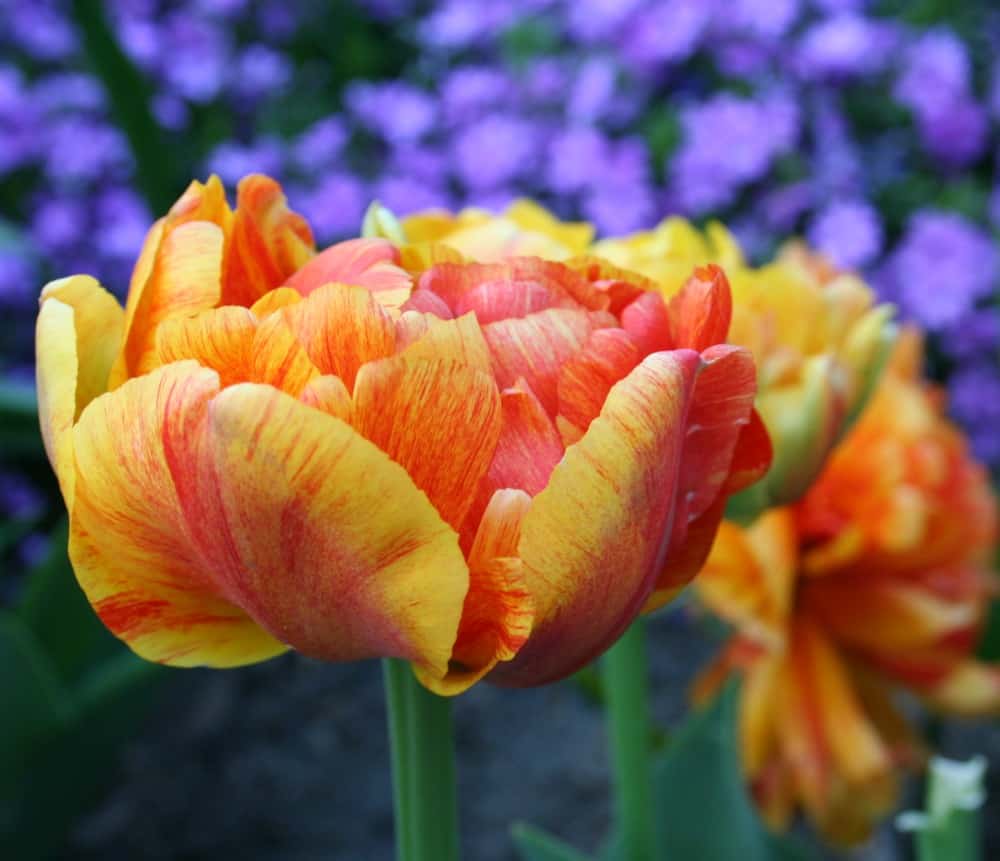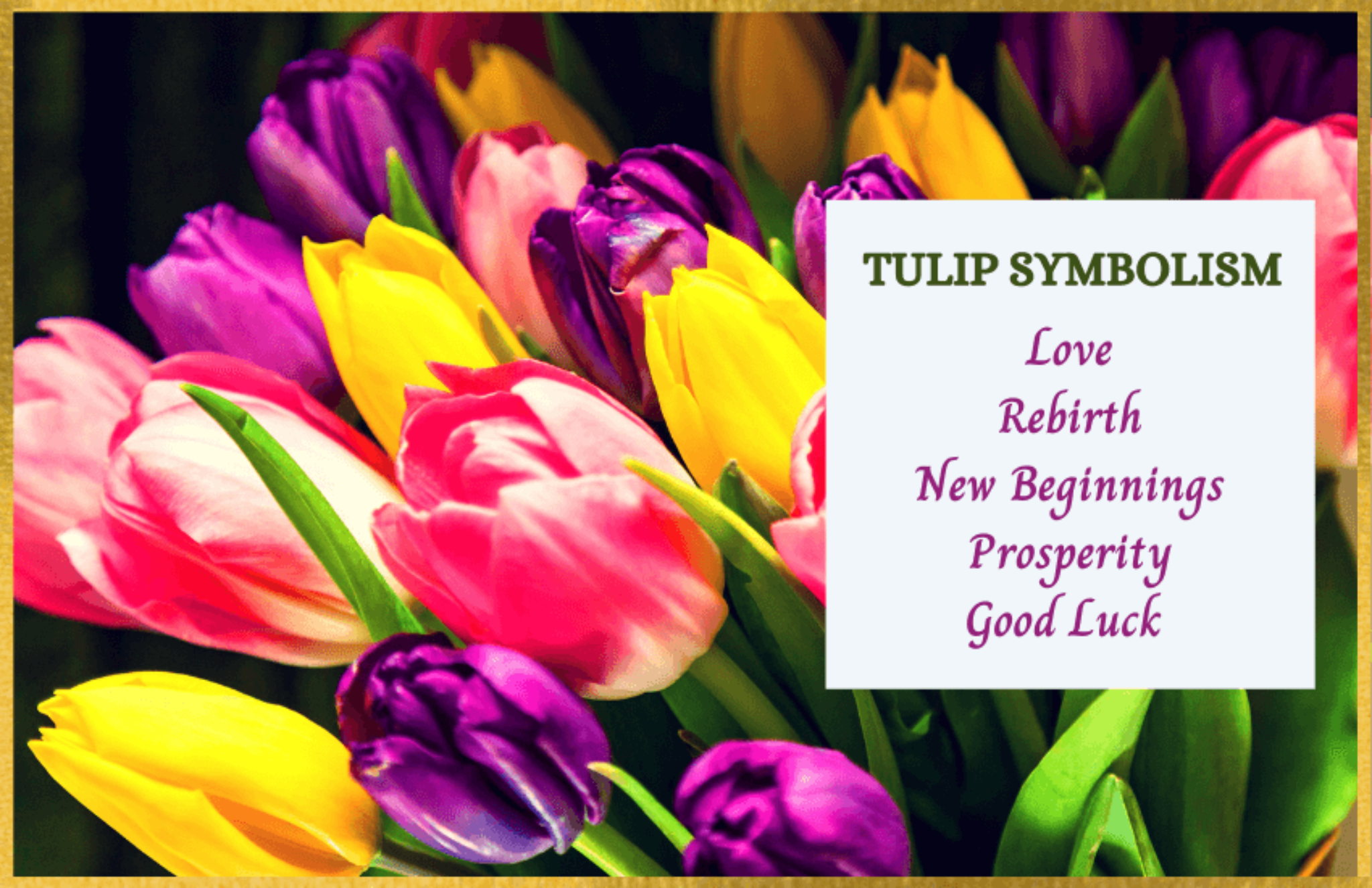What does a double tulip symbolize? Join us on an intriguing journey to uncover the captivating meanings behind these extraordinary flowers. Their beauty extends beyond their petals, carrying layers of historical, cultural, and artistic significance.
From ancient tales to modern-day expressions, double tulips have played a captivating role in shaping our understanding of love, hope, and renewal. Let’s delve into their fascinating world and explore the myriad ways they have captured our hearts and imaginations.
Symbolism in Double Tulips

Double tulips, with their captivating layers of petals, hold a rich historical and cultural significance. Throughout history, these exquisite flowers have been imbued with diverse meanings, reflecting the values and beliefs of different cultures.
Historical Significance
In the 16th century, double tulips were introduced to Europe from the Ottoman Empire, where they were highly prized as symbols of wealth and status. The Dutch, in particular, became enamored with these flowers, leading to the infamous “Tulip Mania” of the 17th century. During this period, double tulips were traded like commodities, with some bulbs fetching exorbitant prices.
Cultural Symbolism
Double tulips have been associated with a wide range of meanings across cultures. In Victorian England, they were symbols of perfect love and affection. In China, they represent prosperity and good fortune. In Japan, double tulips are associated with beauty, grace, and elegance.
Symbolism of the Layered Petals
The double tulip’s unique layered petals hold a particular symbolism. The outer petals represent protection and strength, while the inner petals symbolize vulnerability and beauty. Together, they represent the duality of life, encompassing both strength and fragility.
Double Tulips in Art and Literature: What Does A Double Tulip Symbolize

Double tulips have captivated the imaginations of artists and writers for centuries. Their unique beauty and intricate forms have made them a popular subject in both painting and literature.
Paintings
One of the most famous paintings featuring double tulips is “Vase with Double Tulips” by Vincent van Gogh. This painting, created in 1887, depicts a bouquet of vibrant double tulips arranged in a vase. The tulips are rendered in a thick, impasto style, which gives them a sense of texture and depth. The painting is now housed in the Van Gogh Museum in Amsterdam.
Another notable painting featuring double tulips is “Still Life with Tulips” by Jan Brueghel the Elder. This painting, created in 1607, depicts a table covered with a variety of flowers, including double tulips. The tulips are painted with great detail and accuracy, and the painting is a testament to Brueghel’s skill as a botanical artist. The painting is now housed in the Kunsthistorisches Museum in Vienna.
Literature
Double tulips have also been featured in literature, often as symbols of beauty, love, and fertility. In the novel “The Tulip” by Alexander Dumas, the protagonist, Cornelius van Baerle, is a tulip grower who falls in love with a beautiful woman named Rosa. The double tulip is a symbol of their love, and it is used throughout the novel to represent the beauty and fragility of their relationship.
In the poem “To the Double Tulip” by Andrew Marvell, the speaker praises the beauty of the double tulip and compares it to the beauty of a woman. The poem is a celebration of the tulip’s beauty and its ability to inspire love and admiration.
Double tulips have been used in art and literature to convey a variety of emotions and ideas. They are often symbols of beauty, love, and fertility, but they can also represent other emotions, such as sadness and loss. The double tulip is a versatile symbol that can be used to express a wide range of emotions and ideas.
Double Tulips in Modern Culture

Double tulips have transcended their historical significance and continue to captivate modern-day audiences. Their unique beauty and symbolic meanings have found expression in various facets of contemporary culture.
Fashion and Design, What does a double tulip symbolize
Double tulips have become a popular motif in fashion and design. Their intricate petals and vibrant colors inspire designers to create eye-catching garments, accessories, and home decor. From floral prints on dresses to embroidered tapestries, double tulips add a touch of elegance and sophistication to any space.
Popular Culture
In popular culture, double tulips have appeared in films, television shows, and literature. Their symbolic associations with love, abundance, and prosperity make them a recurring theme in romantic stories and period dramas. Additionally, their unique appearance has caught the attention of artists and photographers, who use them as subjects for their creative endeavors.
Inspiration and Expression
Double tulips continue to inspire creativity and expression. Their complex forms and vibrant hues provide endless possibilities for artistic interpretation. Painters, sculptors, and photographers draw inspiration from their delicate beauty, capturing their essence in their works. In the realm of floral design, double tulips are often used to create stunning arrangements that evoke emotions and convey messages.
Epilogue
In conclusion, double tulips stand as a testament to the power of nature to inspire and enchant. Their symbolism transcends time and cultures, weaving a tapestry of meanings that continue to captivate us today. Whether gracing gardens, adorning art, or inspiring creative expressions, double tulips remind us of the beauty, resilience, and enduring spirit that surrounds us.
FAQ Section
What is the significance of the double tulip’s layered petals?
The multiple layers of petals in a double tulip represent depth, complexity, and the unfolding of beauty and meaning.
How have double tulips been used in art and literature?
Double tulips have been featured in famous paintings and literary works, often symbolizing love, passion, and the fleeting nature of beauty.
What are some modern-day interpretations of double tulips?
In contemporary culture, double tulips are associated with elegance, sophistication, and a celebration of life’s special moments.






